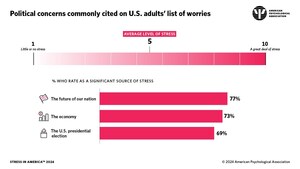Idaho Becomes Fifth State to Allow Psychologists to Prescribe Medications
Law will increase access to care, APA says
WASHINGTON, April 5, 2017 /PRNewswire-USNewswire/ -- The American Psychological Association applauded the Idaho Legislature for passing a bill making the state the fifth to authorize clinical psychologists with advanced specialized training to prescribe certain medications for the treatment of mental health disorders, thereby improving access to a wide range of mental health services, particularly in poorly-served areas.
"Access to appropriate mental health treatment is important throughout the United States, but is particularly critical in Idaho due to a shortage of psychiatrists, long waiting times and a high suicide rate," said APA President Antonio E. Puente, PhD. "This law will enhance access for many Idahoans who face challenges getting treatment for their mental health conditions."
The legislation, which was signed into law by Gov. C. L. "Butch" Otter yesterday, grants prescriptive authority to Idaho licensed psychologists who have completed a post-doctoral master of science degree in clinical psychopharmacology, a supervised practicum in clinical assessment and pathophysiology, and passed a national examination. After meeting these requirements, a prescribing psychologist will have a two-year provisional certificate to prescribe under the mandatory supervision of an MD. These requirements are in addition to the education and training required to become a licensed psychologist – an average of seven years of graduate education beyond the four years of undergraduate work, and several years of supervised clinical training.
"The need for prescribing psychologists in Idaho is clear," Puente said. "Wait times to see a psychiatrist in northern Idaho can be as long as a year, and are often two to three months in the Boise area, according to reports collected by the Idaho Psychological Association. What's more, the suicide rate in Idaho is consistently among the highest in the country."
In 2015, the rate was 57 percent higher than the national average, according to the Idaho Department of Health and Welfare. For young people in Idaho ages 15-34, suicide is the second leading cause of death. According to the Substance Abuse and Mental Health Services Administration, in 2015, an estimated 243,000 Idahoans reported any mental illness in the past year. Between 2009 and 2013, 54 percent of Idahoans reporting mental illness in the past year did not receive treatment.
"Expanding the role psychologists play in managing the care of mental health patients will lead to shorter wait times for mental health services, and lead to stronger integrated care teams," said V. Page Haviland, PhD, president of the Idaho Psychological Association. "We are committed to creating a flagship training program for psychologists desiring psychopharmacology training. This new law marks a win for our clients as well as psychologists."
The training, which must meet APA's requirements to be designated a post-doctoral education and training program in clinical psychopharmacology, will be substantially equivalent to the education required of advanced practice psychiatric nurse practitioners. This training could be offered by Idaho State University as soon as fall 2018.
Susan Farber PhD, who chairs the Idaho Psychological Association state advocacy committee, applauded the collaborative nature of the legislation. "After three years of working with many in the medical community, a consensus was reached," she said. "A bipartisan Legislature voted to support the legislation because it is an effective way to provide services to our citizens. The core values of this legislation are rigorous training and required collaboration."
New Mexico was the first state to pass a prescribing law for psychologists, in 2002. Louisiana followed in 2004, Illinois in 2014 and Iowa in 2016.
The American Psychological Association, in Washington, D.C., is the largest scientific and professional organization representing psychology in the United States. APA's membership includes nearly 115,700 researchers, educators, clinicians, consultants and students. Through its divisions in 54 subfields of psychology and affiliations with 60 state, territorial and Canadian provincial associations, APA works to advance the creation, communication and application of psychological knowledge to benefit society and improve people's lives.
SOURCE American Psychological Association
WANT YOUR COMPANY'S NEWS FEATURED ON PRNEWSWIRE.COM?
Newsrooms &
Influencers
Digital Media
Outlets
Journalists
Opted In





Share this article